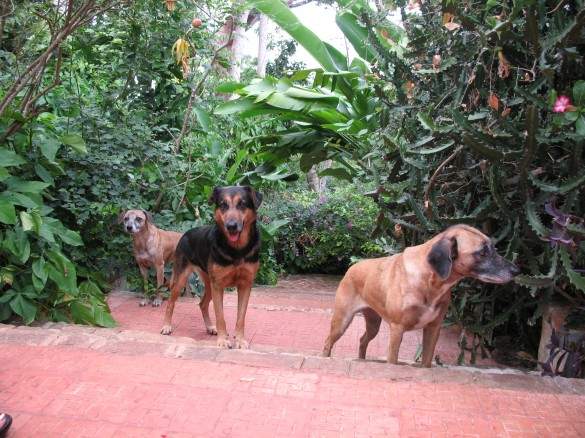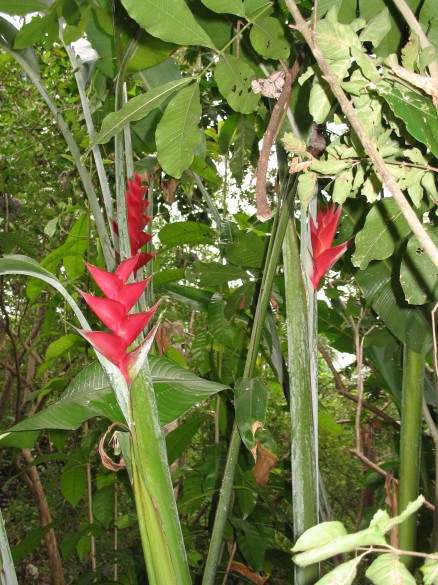Our Jamaican cab driver flipped the radio dial with one hand, waving to roadside friends with the other. His spirit seemed as free as his braids bouncing around whenever he laughed. Coasting down the boulevard was a continuous flash of picture postcards: rickety stands selling woodcarvings, wickerwork and T-shirts blurting, “We Be Jammin’.” On our left, a swatched landscape of red and yellow wildflowers, blue mahoe, and palmetto palms burst with tropical splendor. Far to the right, ribbons of gold danced on a turquoise sea. Inside the cab, rhythms of reggae seduced with a heady beat.
But paradise was lost a few yards down the road. A school enclosed by barbed wire cast a cool shadow under the Caribbean sun. Spikes glinting in the midday light drew attention to a side of the island not found in guidebooks. The underside. Crime in Jamaica, I had read, is attributed to a few key factors: poverty, retribution, drugs, gangs and politics. According to the Jamaica Crime & Safety Report, there was a rise in murders, shootings and break-ins during the autumn of 2007’s national elections. Tough statistics to swallow months later as we flew past fields of sugar cane and nuts, smiling vendors, and the soothing scent of jasmine.
My family and I had been on this island five days tucked behind resort walls. Wanting to venture beyond the gate, we decided to try a community tourism program. Spend time with the locals, the advertisement read, and learn island culture, customs and cuisine. Perhaps the only way to find the real Jamaica, I thought.
Reserving a round-trip cab, we were escorted to a Mediterranean villa-style home perched in the hills of Falmouth, just east of Montego Bay. It’s a wonder the driver tracked down the address. No numbers, mailboxes, nor any clear-cut clues to let visitors know. In fact, many of the homes appeared to be hiding. Flowering trees and shrubs provided camouflage, allowing homes to blend in with their surroundings. Others had high fences laced with hibiscus, bougainvillea, or Mexican creeper. I asked the driver about residential security.
“Sometimes people from the ghettoes storm the better neighborhoods and rob homes,” he said, glancing at me in the rearview mirror. I shifted nervously in my seat.

The driver called our hosts on his cell phone to announce our arrival. Frenzied barking grew more intense as we stepped out of the cab. As my husband, our two teenagers and I peered through shrubbery and twisted vines, we caught the outlines of about a dozen foxhounds jumping up and down behind a wrought-iron fence. My daughter’s tentative steps told me she was having second thoughts.
“Dorothy, is that you?” a voice chimed over the din. I was immediately put at ease. That same melodic voice had greeted me a few days earlier by phone. Maisie, our afternoon hostess, introduced herself and her husband, Devon; then ushered us into their home, padlocking the gate behind us. Satisfied that we posed no danger, half of the dogs nuzzled our hands while the others resumed their posts.
Once past the flurry of fur, we crossed into another world. An outdoor dining area, with just a ceiling but no walls, paved the way to a large custom-built pool. Here where the sky, land and water converged, there was a sense of freedom and vastness. But as I looked across the hillside, shacks crammed tight in disheveled clusters told a different story. They seemed to scream like an angry boil on a perfect complexion. Devon pulled me away without comment.

We learned over a four-course meal that the couple started opening their home to island visitors 20 years ago. Maisie, a woman of about 60, was Jamaican-born and bred. Illustrating strong native ties, Maisie’s personal oil paintings ranged from sails bending in the breeze to flame-red African tulips. Devon was a 71-year-old Ernest Hemingway look-alike who moved to Jamaica 40 years ago from California, when he was the young Project Manager for several resort
development ventures. I read pride in their eyes as we toured the grounds, threading our way through a jungle of healing herbs and cooking spices. We followed a path below 39 varieties of trees often brushing past wildlife sharing their space: spiders, lizards, hummingbirds, mongooses, and 4 dozen pink-eared fruit bats.
But it was the foxhounds that clearly ruled the grounds. Always hovering wherever we trod. And any trespassers, human or otherwise, would set off barking madness. This happened at least half a dozen times while we shared laughs and local wine. The cause of the barking was often a mystery; the noise unraveling an idyllic cocoon.
When it was close to the time of our return cab ride, Devon told us not to wait outside. But his warning was not necessary, as I grieved silently. The thick padlock was a reminder that all was not paradise. Feelings of freedom and openness ended abruptly at the gate.